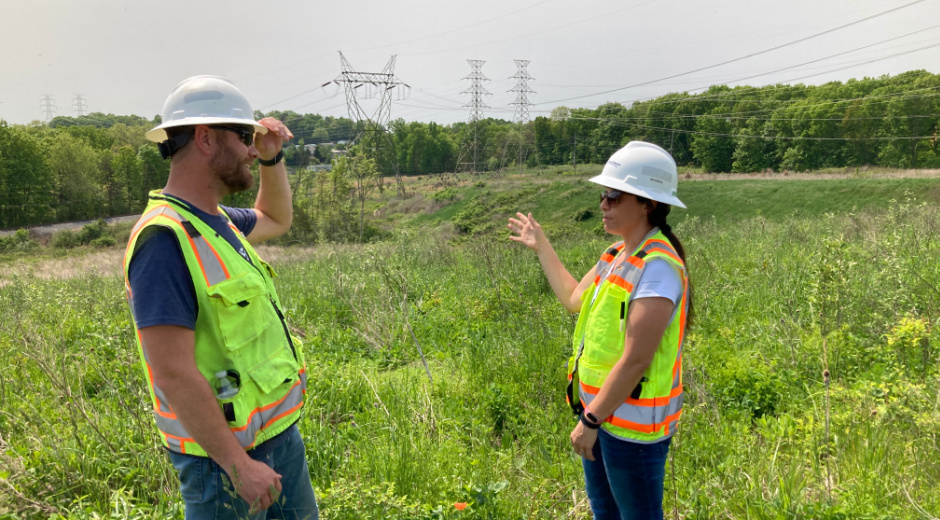FirstEnergy and EPRI Plant the Seeds for a Pollinator-Friendly Future at West Virginia Substation
During a tour of FirstEnergy’s Bedington Substation in Berkeley County, West Virginia, Keith Fuller pauses, spotting an intruder. Ailanthus altissima, an invasive plant species commonly known as Tree of Heaven, has crept into what has become a living laboratory for FirstEnergy and the Electric Power Research Institute (EPRI).
He uproots the offending plant and tosses it aside.
“Ever since I was a little kid, I’ve hated invasive species because I grew up with them,” says Fuller, a transmission forestry specialist with FirstEnergy. “Japanese Knotweed was my enemy.”
FirstEnergy’s forestry specialists work hard to prevent invasive plants from taking hold in the company’s transmission rights of way, the areas where high-voltage transmission lines are installed and maintained. The ongoing research at Bedington Substation aims to provide additional tools in this fight.
On the 30-acre land surrounding the substation, FirstEnergy and EPRI are testing a seed mix consisting of native grasses and flowers. If successful, this mix could effectively prevent unwanted species from invading FirstEnergy’s rights of way while creating new habitats for pollinators, like butterflies, bees and birds.
“In order to provide reliable electricity to our customers, we sometimes have to build new lines, and that impacts the environment,” says Michele Delinger, an advanced forestry specialist with FirstEnergy who focuses on environmental stewardship. “We’re trying to mitigate that, and we’re willing to do the research to put something back that is better than the way we found it.”
Pollinators play a vital role in helping plants reproduce, and those plants in turn produce fruits and vegetables, prevent soil erosion and increase carbon sequestration. Many pollinator populations are in decline due to a loss in feeding and nesting habitats.
FirstEnergy aims to develop 225 acres of new pollinator habitat in its rights of way, substation properties, parks and nature preserves by 2025. The Bedington site stands out for its research component.
In spring 2022, FirstEnergy seeded 20 one-acre plots with either the pollinator-friendly native seed mix or the turf grass mix commonly used for erosion control. Since then, EPRI has been gathering data to assess the performance and establishment speed of the native seed mix.
One year into the three-year, $390,000 study, early results are promising, with the native seed mix achieving over 70% ground cover—crucial for erosion control.
Ashley Bennett, the EPRI research scientist overseeing the Bedington study, acknowledges the hesitancy among utilities to adopt native seed mixes due to concerns about meeting erosion control requirements for construction permits. The Bedington research aims to demonstrate that native seed mixes can match the ground cover provided by turf grass mixes within the same time frame while also providing pollinator habitats.
Additionally, the native seed mix has the potential to reduce maintenance costs in the rights of way. With a greater number of species and deeper-rooted grasses and flowers, the native mix improves drought resistance, combats soil erosion and fends off invasive species.
At the Bedington site, the height and richness of flowering species in the native mix are evident, with clumps of Black-eyed Susan and common milkweed scattered across the plots, in contrast to the lower vegetation of the turf mix.
Over the next two years, EPRI will continue collecting data to determine if the native mix attracts more pollinators over time and provides value to wildlife, including insect species that bats rely on for food. They will also evaluate the performance of both plot types in terms of vegetation management, such as mowing.
“This is the groundbreaking one,” Fuller says of the Bedington study. “The data that comes out of this will hopefully lead us into managing our rights of way better.”
For more information on FirstEnergy's environmental and corporate responsibility efforts, click here.
MEDIA CONTACT: Will Boye, (301) 790-6420

